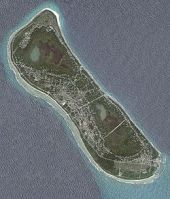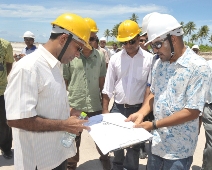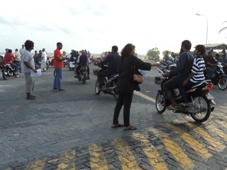Former President Maumoon Abdul Gayoom announced today that the new party formed under his leadership is to be called the Progressive Party of Maldives (PPM).
Speaking at a live press conference at private broadcaster DhiTV, Gayoom revealed that the party’s charter has been drafted and registration forms would be submitted to the Elections Commission (EC) today.
“We are forming a new political party to achieve very important national purposes,” he said. “That is to strengthen Islam in the country and maintain Islam as a religion that we all love and respect, to fully protect our independence and sovereignty, to establish a strong democratic system in the Maldives, ensure happiness and prosperity to the people, to reform the country to make it a place where people would want to live, uphold public order, peace and stability, and facilitate equality opportunity for everyone to advance.”
Gayoom explained that he resigned as ‘Honorary Leader’ (Zaeem) of the main opposition Dhivehi Rayyithunge Party (DRP) yesterday because his efforts to reform the party over the past several months were unsuccessful.
Gayoom invited experienced politicians, “capable and educated youth” and skilled professionals to join the party. The former President expressed gratitude to those who assisted and supported the formation of the Progressive Party.
Asked repeatedly by reporters if he intended to contest in the party’s presidential primary, Gayoom stressed that he had not made a decision and would do so “when the time comes.”
“My answer is that the time [for a primary] has not come and we’ll know when it does,” he said, refusing to rule out a possible bid for the presidency in 2013.
On whether his role as leader of the new party contradicted an announcement in February 2010 that he was retiring from active politics, Gayoom said he made the decision based on the assurance that the DRP would function “according to certain principles.”
“At the time and even up till yesterday, I was at the most senior post of one of the largest political parties in the country,” he said. “So how can it be said that the person in the highest post of a political party is not involved in politics? Up till yesterday I was in politics. Today I am forced to create a new party because of the state of the nation and because it has become necessary to find another way for the country.”
As “a lot of citizens” had pleaded with him to form a new party, said Gayoom, he made the decision as “a national obligation.”
In his letter of resignation submitted yesterday, Gayoom said he was “forced” to leave the party he had formed on July 21, 2005 because the DRP had become “politically toothless” and DRP Leader Ahmed Thasmeen Ali was “acting dictatorially” and violating the party’s charter and democratic principles.
“And you [Thasmeen] keep saying clearly in the media that you do not need my counsel,” reads the letter shared with local media. “The consequence of that was the loss of hope citizens had in this party. And DRP getting the bad name of the party that gives way to the government while remaining in name a responsible opposition party.”
DRP Leader Ahmed Thasmeen Ali however dismissed the main points raised in Gayoom’s letter yesterday as “baseless claims” offered to defend his decision to resign.
The Zaeem-faction’s activities hampered DRP’s efforts to hold the government accountable, Thasmeen wrote in response, and would be “written in Maldivian political history as a shameful [episode].”
Thasmeen asserted that Gayoom decided to leave the party because he could not influence the party’s day-to-day management and functions in his ‘honorary’ role.
“Since the party’s charter does not give you that role, the fact that you tried to get your way together with a few people within the party regardless of what happened to the party is evident for all to see,” Thasmeen’s rebuttal reads.
The minority leader of parliament noted that three former DRP deputy leaders – former Attorney General Hassan Saeed, former Finance Minister Gasim Ibrahim and current Independent MP Ahmed ‘Sun Travel’ Shiyam along with other cabinet ministers – left the party to form new parties and compete against Gayoom in the 2008 presidential election.
Gayoom meanwhile said today that he had not received the letter and could not comment on its contents: “There are no personal problems between me and Ahmed Thasmeen Ali,” he insisted.




